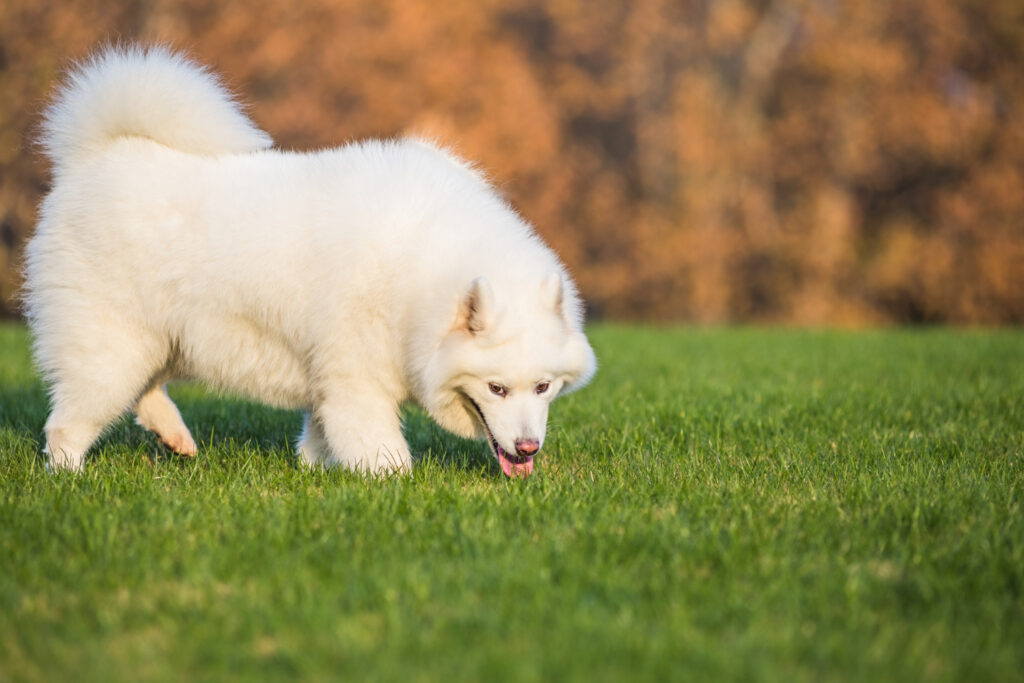Is your dog constantly biting his tail? This behavior can be concerning for pet owners and uncomfortable for your dog. Tail biting can result from various causes, including medical issues like allergies or infections, or behavioral problems such as anxiety or boredom.
Understanding why your dog bites his tail is crucial for addressing the root cause and finding the right solution.
In this article, we’ll explore the common reasons behind this behavior and provide practical tips to help your dog stop biting his tail, ensuring a happier and healthier pet.
1. Fleas and Ticks
One of the most common reasons for a dog to bite their tail is the presence of fleas or ticks. These pesky parasites can cause severe itching and discomfort, leading your dog to constantly bite or chew at their tail.
Regularly check your dog’s fur for any signs of fleas or ticks. Consult with your veterinarian about appropriate preventive measures and treatments.
2. Allergies
Just like humans, dogs can also develop allergies to certain substances, such as pollen, dust mites, or certain ingredients in their food. Allergies can cause itching and irritation, forcing your dog to chew or bite their tail to find relief.
Consult with your veterinarian to determine the underlying cause of your dog’s allergies and discuss possible treatment options.
3. Skin Infections
Skin infections, such as dermatitis or fungal infections, can lead to intense itching and discomfort for your dog. Biting their tail may be a way for them to reduce the irritation caused by these infections.
If you suspect your dog has a skin infection, it is essential to seek veterinary care for proper diagnosis and treatment.
4. Anxiety or Stress
Dogs, just like humans, can experience anxiety or stress. When dogs feel anxious or stressed, they may express various behaviors, including excessive tail biting. This behavior can be a way for them to cope with their emotional distress.
Identifying the underlying cause of your dog’s anxiety or stress and providing them with a calm and secure environment can help lessen this behavior.
5. Boredom or Lack of Stimulation
Dogs are intelligent creatures that require mental and physical stimulation to stay happy and content. If your dog is bored or lacks proper stimulation, they may resort to biting their tail as a form of self-entertainment.
Ensure your dog receives enough exercise, playtime, and interactive toys to keep them mentally and physically engaged.
6. Tail Injuries or Pain
In some cases, dogs may bite their tail due to an injury or underlying pain in that area. Tail injuries can occur from accidents, trauma, or even when it gets caught in something.
If you suspect your dog is experiencing pain or has sustained an injury, consult with your veterinarian for a thorough examination and appropriate treatment.
7. Compulsive Behavior
Compulsive behaviors, such as tail chasing or tail biting, can be observed in some dogs. This behavior is often repetitive, and dogs may engage in it compulsively without any apparent reason.
Compulsive behaviors can be complex, and it is advisable to seek professional help from a veterinary behaviorist to manage and address such behaviors effectively.
8. Anal Gland Issues
Issues with the anal glands can cause discomfort and itchiness for dogs. When dogs bite their tails excessively, it could be a sign of anal gland problems.
The anal glands may need to be expressed or treated if they become infected or impacted. Consult with your veterinarian if you suspect your dog is experiencing anal gland issues.
9. Orthopedic Problems
Orthopedic problems, such as arthritis or joint pain, can also lead to tail biting in dogs. When dogs experience pain in their joints or spine, they may try to reduce the discomfort by biting their tail.
If you suspect your dog is suffering from orthopedic issues, consult with your veterinarian to explore appropriate treatment options.
10. Alluring Smells or Taste
Sometimes, dogs may bite their tails if they catch an attractive scent or taste on their tail. It could be something they found in the environment, such as food or other animals’ scent.
While this may not be a cause for concern in most cases, it’s essential to discourage this behavior to prevent potential health risks or consumption of harmful things.
11. Insect Bites or Stings
Insect bites or stings, such as those from bees, wasps, or ants, can cause irritation and itching for dogs. If your dog is frequently biting their tail and you notice signs of insect bites or stings, provide them with relief by applying a veterinarian-approved anti-itch cream or consult with your veterinarian for appropriate treatment.
12. Skin Irritants
Certain substances or chemicals, such as harsh shampoos or cleaning agents, can irritate a dog’s sensitive skin. If your dog bites their tail after being exposed to such irritants, it may be a sign of discomfort or an allergic reaction.
Use gentle and dog-friendly products when grooming or cleaning your dog’s environment.
13. Habitual Behavior
In some cases, dogs may develop a habit of biting their tail that is not related to any specific underlying issue. This behavior can start due to boredom, stress, or imitation of other dogs.
If the habit persists and causes concern, consult with your veterinarian for guidance on breaking the habit and redirecting your dog’s behavior.
Why Does My Dog Bite His Tail?- Prevention Tips
Now that we have explored some of the reasons why dogs bite their tails. Let’s discuss some prevention tips to help address this behavior:
1. Regular grooming
Keep your dog’s coat clean and well-groomed to minimize the risk of skin irritations and infections.
2. Flea and tick prevention
Use veterinarian-recommended flea and tick preventatives to protect your dog from these parasites.
3. Allergy management
If your dog has allergies, work with your veterinarian to identify and manage the triggers that cause itching and discomfort.
4. Provide mental and physical stimulation
Engage your dog in interactive play sessions, provide puzzle toys, and take them for regular walks to keep them mentally and physically stimulated.
5. Address anxiety and stress
Create a calm and secure environment for your dog. Also, consider behavior modification techniques or medications under the guidance of a veterinarian.
6. Seek professional help
If your dog’s tail biting becomes a compulsive or persistent behavior, consult with a veterinary behaviorist for specialized guidance.
Remember, every dog is unique, and it may take time and patience to identify the underlying cause and find the most effective solution for your furry friend. Your veterinarian is an excellent resource for personalized advice based on your dog’s specific needs.
Conclusion
While it can be concerning to see your dog biting their tail, there can be various reasons behind this behavior. From fleas and allergies to anxiety and habit formation, understanding the underlying cause is crucial for providing appropriate care and preventing further discomfort.
By implementing prevention tips and seeking veterinary guidance when needed, you can help your dog lead a happy and tail-biting-free life.
Frequently Asked Questions (FAQs)
Why does my dog bite his tail?
There can be various reasons why your dog may bite his tail. It could be due to fleas or ticks, allergies, skin infections, anxiety or stress, boredom, tail injuries or pain, compulsive behavior, anal gland issues, orthopedic problems, alluring smells or taste, insect bites or stings, skin irritants, or simply a habitual behavior.
How can I tell if my dog is biting his tail due to fleas or ticks?
If your dog is biting his tail due to fleas or ticks, you may notice them scratching or biting at their tail excessively. You might also observe small, black specks (flea dirt) on their fur, redness or irritation around the tail area, or the presence of actual fleas or ticks on their skin.
It is important to consult with your veterinarian to confirm the presence of fleas or ticks and discuss appropriate treatment options.
What should I do if my dog’s tail biting is caused by anxiety or stress?
If your dog’s tail-biting behavior is related to anxiety or stress, it is essential to address the underlying cause and provide them with a calm and secure environment. Consider consulting with a veterinarian or a professional dog behaviorist for guidance.
They can help you develop a behavior modification plan, recommend appropriate training techniques, or even suggest medications that may help alleviate your dog’s anxiety or stress.
How can I prevent my dog from biting his tail out of boredom?
To prevent your dog from biting his tail out of boredom, ensure they receive enough mental and physical stimulation. Engage them in interactive play sessions, provide them with puzzle toys or treat-dispensing toys that can keep them occupied, and take them for regular walks or provide other forms of exercise.
Additionally, consider rotating their toys to keep them mentally engaged and offer a variety of stimuli.
When should I seek veterinary help for my dog’s tail biting?
If your dog’s tail-biting behavior persists, worsens, or is accompanied by other concerning symptoms, it is advisable to seek veterinary help. This is particularly important if you notice signs of infection, excessive redness or swelling, open wounds, hair loss, or if your dog appears to be in pain.
A veterinarian will be able to examine your dog, identify any underlying issues, and recommend appropriate treatment or behavior management strategies.


